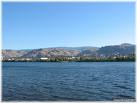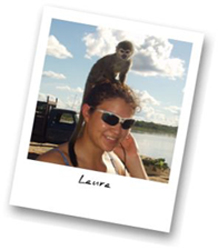Again in a Canoe

"Laura, how many strokes per side are you doing?" my mom asks from the back of the canoe.
"Oh, around ten," I respond, as though I expect that to be fine. I'm not being completely honest here since I'm doing exactly ten and doing it with the conviction that ten strokes per side is definitely not okay. I know that my mom and Kathleen take five strokes per side, but Kathleen is in Arizona for a couple of weeks so I'm taking her place for today in the front of the canoe.
"Why don't you do around five strokes," advises my mom. Knowing better than to disagree, I switch to exactly five strokes per side. So much for being rebellious.
Except apparently five strokes isn't the norm; it's actually supposed to be six strokes because a few switches later I hear, "why don't you try about six strokes per side." Then I switch to exactly six strokes per side and we settle into a rhythm with the river. It's windy and we have to paddle with conviction to make headway up the Columbia, especially when we hit the current going around Windy Point. To avoid the wind we dodge into the estuaries at the confluence of the Wenatchee and Columbia Rivers. Once we get away from the wide open expanse of the Columbia
 the urgency of paddling abates and I'm reminded of the last time I was in a canoe ten months ago.
the urgency of paddling abates and I'm reminded of the last time I was in a canoe ten months ago.
It was in the Peruvian Amazon on the Black River, el rio negro, except that it wasn't even called el rio negro because it was "the black river" in Quechua, the indigenous language of Peru, not in Spanish. Six days paddling through narrow tortuous jungle streams with exotic flora and fauna at every turn. There's a world of difference between my paddle today and that trip. My mom and I are in a stable, unbelievably lightweight canoe as opposed to a handmade, cumbersome, dugout canoe. While my wooden paddle is arduously heavy when I compare it to my mom's sleek black carbon fiber paddle, it's eons fancier than the rough-hewn, bulky paddles we were using in Peru. Those paddles were only sanded by the friction from our hands, only varnished by the murky jungle water.
one. two. three. four. five. six. switch. The paddle flips up in front of me and strikes back into the water on the other side of the canoe. I focus on switching quickly to reduce the amount of time between power applications. I can't dwell on how my hands swap position so quickly or the impossibility of it befuddles me and I falter. I know when I miscount my strokes because I can feel when my mom switches one stroke earlier or one stroke later than I. The six stroke count is embedded in her muscle memory and she doesn't need to count it, but up front the constant chant marches through the back of my mind, a sturdy and regular trellis for the thought tendrils growing in my mind.

I wonder at the differences between these two streams, and whether one could claim to be more fascinating than the other. Surely the lush verdure of the amazon affronts you and the abundance of life astounds. My mom and I glide through the estuary past the birds and the beaver carvings without leaving a mark behind us; Cammie and I were not so gentle on the jungle river.

We ate fish out of it for dinner, lunch, and... breakfast (here I am clubbing to death a fish that Jose speared, "con fuerza, con fuerza," he urged me). Our guides insisted on seizing anything they could out of the water to impress us, and we were duly impressed. Jose abruptly stopped the canoe, paused looking over the side of the boat, shot both his arm into the river and heaved this monster out. Needless to say, I wore shoes when we went swimming and was very very scared that I would disturb an electric eel or a crocodile or an anaconda or one of the numerous other poisonous or dangerous animals we saw.

Today I am more concerned with my cadence and power, with using my torso and locking out my arms than searching for wildlife. I know the herons and eagles, the beavers and river otters are here and if they don't show themselves while I'm out today, I'll be back another day. Just to be in the water is enough and I know, somehow, that what Sigurd Olson wrote is true: "When a man is part of his canoe, he is part of all that canoes have ever known."


0 Comments:
Post a Comment
<< Home